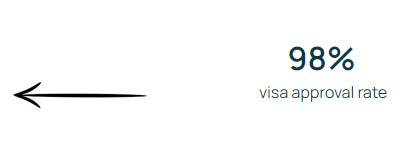Turkey visa entry requirements
Everything you need to know about entry requirements for Turkey: visa, e-visa, passport validity, travel insurance and health requirements.
 Fast: Simplified, efficient process.
Fast: Simplified, efficient process.
 Security: information is protected.
Security: information is protected.
 Reliability: 98% approval rate.
Reliability: 98% approval rate.
 Assistance: 24/7 customer support.
Assistance: 24/7 customer support.


The conditions for entering Turkey are very important, as they determine whether you need a visa or whether you are exempt from this requirement. By understanding these conditions, you can plan your trip accordingly, making sure you have the necessary documents before you leave. Whether you are planning a tourist visit, a business trip or a stopover, it is essential to respect the rules for entering Turkey to avoid any inconvenience or problems when you arrive at the border. The rules can vary depending on your country of residence, the length of your stay and other factors, so it's crucial to be well informed to avoid any unforeseen inconveniences. In the following sections, we'll explore visa requirements for Turkey in detail, focusing on visa-exempt and e-visa eligible countries. In addition, we'll look at specific conditions to consider, such as passport validity, rules on travelling with children, financial evidence needed, health and vaccination requirements, and much more.
Visa for Turkey: in brief
- From Europe: Most European nationals do not need a visa to enter Turkey.
- Online application: You can apply for a visa online via the official Turkish government website or through a private service provider, which makes the process easier.
- Price: The cost of an e-Visa is generally around €32, payable online when you apply.
- Processing time: The e-Visa for Turkey is usually issued within minutes of submitting the application and payment, although it can take up to 24 hours.
- Length of stay: The visa allows a stay in Turkey of up to 90 days within a 180-day period, allowing multiple entries.


Turkey has a well-established visa system to regulate the entry of foreign visitors to its territory. Depending on your nationality and the purpose of your trip, you may need a tourist visa to enter Turkey. However, there are also countries whose nationals are exempt from visas or who are eligible for e-visa, a convenient, electronic option for obtaining visas.
Some countries are visa-free for Turkey, which means that their nationals can enter Turkey without a visa. The length of stay allowed without a visa varies according to nationality. Countries whose citizens are exempt from visas for Turkey include the countries of the European Union, Argentina, Brazil, the United Kingdom, Australia, Chile, South Korea, etc. However, it is important to check the latest updates and the specific conditions for your country before travelling.
The length of stay authorised without a visa also varies according to your nationality. As a general rule, nationals of visa-exempt countries can stay in Turkey for up to 90 days within a 180-day period. However, it is advisable to check the specific rules for your country, as they may be subject to change.
The Turkish e-visa is a practical alternative to the traditional visa. It allows nationals of certain countries to obtain their visa online, without needing to visit a Turkish embassy or consulate. The e-visa is generally intended for tourist and business visitors wishing to stay in Turkey for up to 90 days.
Several countries are eligible for the Turkish e-visa, including the United States, Canada, Australia, China, Mexico and many others. It is important to consult the official list of countries eligible for e-visa to check whether your country is one of them.
The procedure for applying for an e-visa for Turkey is simple and can be done online. Here are the steps to follow:
It is advisable to apply for your e-visa well in advance of your trip, to allow time for your application to be processed. You should also ensure that you have a reliable Internet connection and a printer so that you can obtain a copy of your e-visa.
The price of a visa for Turkey varies according to the type of visa and the method of application. The e-Visa, which can be applied for online, costs around €32. Transit and work visas, on the other hand, require an application in person and cost between 60 and 120 euros for transit and 80 euros for work, respectively.
When travelling to Turkey, it is essential to check the validity of your passport. The Turkish authorities generally require your passport to be valid for at least six months from the date of your intended entry. Please ensure that your passport meets this requirement before you leave, to avoid any problems at the border.
If you are travelling to Turkey with children, it is important to take into account the specific rules that apply. Children generally need their own individual passport to enter Turkey. Furthermore, additional requirements may apply, such as travel authorisation from parents or legal guardians, particularly in the case of travel by a single parent or without both parents being present. It is advisable to consult the Turkish authorities or consulates for the most up-to-date information on the specific requirements for travelling with children.
When you arrive in Turkey, the authorities may ask you to show proof of sufficient financial means to cover your expenses during your stay. This may include recent bank statements, credit cards, traveller's cheques or other evidence of adequate financial resources. It is important to have these documents ready and to hand when you travel.
It is strongly recommended that you take out travel insurance before travelling to Turkey. Although it is not compulsory in all cases, adequate travel insurance can give you peace of mind in the event of a medical emergency, accident or loss of luggage. Be sure to read the terms and conditions of your insurance policy carefully to ensure that it covers all your planned activities in Turkey.
Before travelling to Turkey, it is important to check health and vaccination requirements. Although most travellers are not subject to compulsory vaccination requirements, it may be recommended or advisable to be vaccinated against certain diseases, such as diphtheria, tetanus, poliomyelitis and hepatitis A. Consult your doctor or a health centre specialising in international travel for personalised advice on vaccinations and health precautions to take before travelling to Turkey.
On this page, we have explored the conditions for entering Turkey, focusing on visa requirements, visa-exempt countries and countries eligible for e-visa. We have also covered specific conditions such as passport validity, rules on travelling with children, proof of sufficient financial means, compulsory travel insurance and health and vaccination requirements.
It is crucial to find out in detail about the conditions for entering Turkey before planning your trip. By understanding the visa requirements specific to your nationality, as well as other conditions such as passport validity and health requirements, you can avoid any inconvenience or problems when you arrive in Turkey. Being well-informed will enable you to prepare properly and take all the necessary steps for a trouble-free trip.
It is essential to note that the rules and requirements for entering Turkey are subject to change. The information provided on this page is based on current knowledge, but it is always advisable to check the latest updates with the relevant Turkish authorities, such as consulates or official websites, before you travel. Regulations may vary depending on your nationality, the length of your stay and other factors, so it is important to ensure that you have the most up-to-date and accurate information.
By following the entry requirements for Turkey and preparing properly, you can make the most of your stay in this fascinating country and discover all it has to offer.
Find out if your question has been answered in the list below
Several countries are visa-free for Turkey, allowing their nationals to enter without a visa. These countries include members of the European Union, Argentina, Brazil, the United Kingdom, Australia, Chile and South Korea, among others. However, it is essential to check the latest updates and the specific conditions for your country, as they may vary.
The Turkish e-visa is a practical option for obtaining a visa. It allows nationals of certain countries to obtain their visa online, without having to visit a Turkish embassy or consulate. Countries eligible for e-visa include the United States, Canada, Australia, China, Mexico and many others. We recommend that you consult the official list of countries eligible for e-visa to check whether your country is one of them.
To obtain an e-visa for Turkey online, follow these steps: Access the official Turkish government website, fill in the application form with your personal and passport details, pay the visa fee, submit your application and wait for confirmation by e-mail. Once approved, print out your e-visa and present it with your passport when you arrive in Turkey to be allowed entry. Check the official website for the latest and most accurate information.